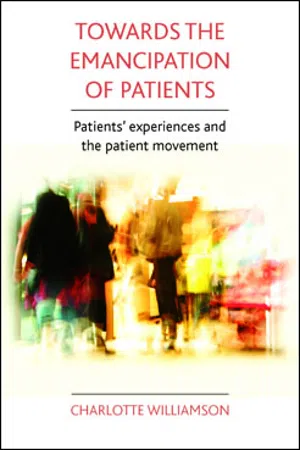![]()
References
Note: For some sorts of writing, a patient’s accounts of his or her care, for example, it can be useful to know the author’s gender. I have therefore included authors’ first names whenever possible.
Abel-Smith, Brian (1964) The hospitals 1800–1948: A study in social administration, London: Heinemann.
AIMS (Association for Improvements in the Maternity Services) and NCT (National Childbirth Trust) (1997) A charter for ethical research in maternity care, London: AIMS and NCT.
Alderson, Priscilla, Hawthorne, Joanna and Killen, Margaret (2005) ‘The participation rights of premature babies’, The International Journal of Children’s Rights, vol 13, pp 31–50.
Alderson, Priscilla, Hawthorne, Joanna and Killen, Margaret (2006) ‘Parents’ experiences of sharing neonatal information and decisions: Consent, cost and risk’, Social Science & Medicine, vol 62, pp 1319–29.
Alderson, Priscilla, Madden, Mary, Oakley, Ann and Wilkins, Ruth (1994) Women’s views of breast cancer treatment and research, Report of a pilot project 1993, London: Social Science Research Unit, Institute of Education, University of London.
Alford, Robert R. (1975) Health care politics: Ideological and interest group barriers to reform, Chicago: University of Chicago Press.
Allsop, Judith and Mulcahy, Linda (1999) ‘Doctors’ responses to patient complaints’, in Marilynn M. Rosenthal, Linda Mulcahy and Sally Lloyd-Bostock (eds) Medical mishaps: Pieces of the puzzle, Buckingham: Open University Press, pp 124–40.
Allsop, Judith, Jones, Kathryn and Baggott, Rob (2004) ‘Health consumer groups in the UK: a new social movement?’, Sociology of Health & Illness, vol 26, no 6, pp 737–56.
Andrea (2001) ‘Father as witness’, Letter to Midwifery Matters, vol 88, Spring, p 33.
Annas, George J. (1975) The rights of hospital patients: The basic ACLU [American Civil Liberties Union] guide to a hospital patient’s rights, New York: Avon Books.
Annas, George J. (1998) ‘A national bill of patients’ rights’, New England Journal of Medicine, vol 338, no 10, pp 695–9.
Anon (1982) ‘Human relations in obstetrics: Father knows best?’ AIMS Quarterly Journal, Spring, pp 1–3.
Anon (1998) ‘The ostrich view of the world’, The Economist, vol 349, p 39.
Anon (2007/8) ‘Informed consent’, AIMS Journal, vol 19, no 4, pp 10–11.
Arksey, Hilary (1994) ‘Expert and lay participation in the construction of medical knowledge’, Sociology of Health & Illness, vol 16, no 4, pp 448–68.
Armstrong, David and Ogden, Jane (2006) ‘The role of etiquette and experimentation in explaining how doctors change behaviour: A qualitative study’, Sociology of Health & Illness, vol 28, no 7, pp 951–68.
Armstrong, S[arah] L. (2009) ‘A view from the other end of the laryngoscope’, Bulletin of the Royal College of Anaesthetists, vol 54, pp 39–41.
Austoker, Joan, Mansel, Robert, Baum, Michael, Sainsbury, Richard and Hobbs, Richard (1995) Guidelines for referral of patients with breast problems, Sheffield: NHS Breast Screening Programme.
Baggott, Rob, Allsop, Judith and Jones, Kathryn (2005) Speaking for patients and carers: Health consumer groups and the policy process, Basingstoke: Palgrave Macmillan.
Bate, Paul and Robert, Glenn (2007) Bringing user experience to healthcare improvement: The concepts, methods and practices of experience-based design, Oxford: Radcliffe Publishing.
Bate, P[aul], Robert, G[lenn] and Bevan, H. (2004) ‘The next phase of healthcare improvement: what can we learn from social movements?’, Quality & Safety in Health Care, vol 13, pp 62–6.
Bates, Claire (2001) ‘The good doctor’, Clinical Medicine, vol 1, no 2, pp 128–31.
Bates, Thelma and Evans, Richard G.B. (1995) Report of the independent review commissioned by the Royal College of Radiologists into brachial plexus neuropathy following radiotherapy for breast carcinoma, London: Royal College of Radiologists.
Batt, Sharon (1994) Patient no more: The politics of breast cancer, London: Scarlet Press.
Beech, Beverley (2004/5) ‘Episiotomy: Still a sore subject’, AIMS Journal, vol 16, no 4, pp 18–19.
Beech, Beverley (2005) ‘Choice – an abused concept that is past its sell-by date’, AIMS Journal, vol 17, no 4, pp 3–4.
Belson, Peg (1981) ‘Parents’ advocacy for parents’, in Pat Azarnoff and Carol Hardgrove (eds) The family in child health care, New York: John Wiley & Sons, pp 217–31.
Belson, Peg (2004) ‘To get our agenda on other people’s agenda’, in Helene Curtis and Mimi Sanderson (eds), The unsung sixties: Memoirs of social innovation, London: Whiting & Birch Ltd, pp 357–70.
Berwick, Donald M. (2003) ‘Errors today and errors tomorrow’, New England Journal of Medicine, vol 348, no 25, pp 2570–2.
Bewley, Susan (1992) ‘The law, medical students and assault’, BMJ, vol 304, pp 1551–3,
Birkinshaw, Patrick (1994) Grievances, remedies and the state (2nd edn), London: Sweet & Maxwell.
Blenkinsopp, A[lison], Wilkie, P[atricia], Wang, M[adeleine] and Routledge, P[hilip] A. (2006) ‘Patient reporting of suspected adverse drug reactions: a review of published literature and international experience’, British Journal of Clinical Pharmacology, vol 63, no 2, pp 148–56.
Blennerhassett, Mitzi (1998) ‘Truth, the first casualty’, BMJ, vol 316, pp 1890–1.
Blennerhassett, Mitzi (2008) Nothing personal: Disturbing undercurrents in cancer care, Oxford: Radcliff Publishing.
Borkman, Thomasina (1997) ‘A selective look at self-help groups in the United States’, Health and Social Care in the Community, vol 5, no 6, pp 357–64.
Bosk, Charles L. (1979) Forgive and remember: Managing medical failure, Chicago: University of Chicago Press.
Bourdieu, Pierre (1998) Practical reason: On the theory of action, Cambridge: Polity Press.
Bowlby, John (1965) Child care and the growth of love (2nd edn), Harmondsworth: Penguin Books, abridged from Maternal care and mental health (1951), Geneva: World Health Organisation.
Brain, D.J. and Maclay, Inga (1968) ‘Controlled study of mothers and children in hospital’, BMJ, vol 2, pp 278–80.
Bristol Royal Infirmary Inquiry (2000) Interim report, Removal and retention of human material, Annex A. London: Central Office of Information.
Bristol Royal Infirmary Inquiry (2001) Learning from Bristol: The report of the public inquiry into children’s heart surgery at the Bristol Royal Infirmary, 1984–1995, London: Stationery Office.
British Geriatric Society and Royal College of Nursing (1975) Improving geriatric care in hospital, London: Royal College of Nursing.
British Medical Association, Resuscitation Council (UK) and Royal College of Nursing (2001) Decisions relating to cardiopulmonary resuscitation, London: British...
